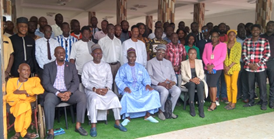By: Kebba AF Touray
The Gambia’s Public Utilities Regulatory Authority dubbed PURA, has on Wednesday 16th August 2023, held a dialogue and training forum for the licensed broadcast media outlets in the Gambia.
Held under the theme “Dialogue and Training of Broadcast Media for improved Compliance with the Regulatory Framework,” the forum was aimed at ensuring improvement in the compliance level of the broadcast media to the regulatory framework.
Ms. Emma Mendy, Director of Legal and Licensing and Enforcement, PURA, said that this is of great significance, adding that they have experienced the immense benefits of freedom of expression, the benefit of ethical journalism, and perhaps in one way or the other, the harmful effects of media representation.
She added: “As a regulator, I have come to realize that media regulators require much more than setting the laws and policies, but overcoming the challenges of what comes with regulations in the context of Africa and young democracies all over the world, while upholding regulatory confidence in our process.”
She added that freedom of expression rights conversations and initiatives amongst regulators and the public at large centered dominantly on protecting nascent spaces for media discourse against external coercion.
While challenging the media houses and the public to be mindful of the stories that they share normalized and broadcast, she also challenged PURA and Government to also go international and thoughtful about the regulatory practice that they normalize.
Mr. Baboucarr Cham, Chairman, Media Council, said the council called for the attainment of the three main objectives that the council is committed to.
The aims as explained by the MCG Chairman are to promote and uphold the highest professional standards of journalism in the Gambia, provide an independent and effective channel to consider, investigate and resolve complaints about the conduct of the media, and ensure adherence to the spirit and letter of the GPU’s Code of Conduct for Media Practitioners and the MCG Constitution.
He said this is to ensure having “a public trusted media” as vision and ‘to protect the credibility of the media”, as mission in line with which the media council is operating with a governing council comprised of eleven professionals from different walks of life, an executive secretary and a three member ethics panel.
Mr. Yusupha M Jobe, Director General of PURA, said the theme encapsulates their goal of fostering a media landscape that not only informs and entertains, but also adheres to the highest standards of professionalism and regulatory compliance.
“As journalists, you bear a tremendous responsibility in shaping public perception, disseminating information, and contributing to the democratic discourse. Your role surpasses mere reporting; it is about presenting accurate, unbiased, and contextually rich events that empower the public with the knowledge they need to make informed decisions,” he said.
He stressed that their understanding of the complexities of the regulatory framework can sometimes be daunting , but that they are converged to simplify and clarify, ensuring that the participants can focus on what they do best-delivering impactful stories that resonate with the public.
The Information Minister, Lamin Queen Jammeh, said the theme for the event is apt and significant in view of the stage of the National Development Plan, especially in the media and information sector, and expressed his joy to be associated with the dialogue training for the broadcast media on regulatory framework.
He said “Under the current administration of H.E President Adama Barrow, the media landscape of the Gambia shall continue to be free to the spirit of the letters of all those regulations that have been provided for them. It is the understanding of this administration that information is the live-blood of any democratic society”.
He added that if the information is to serve the live-blood of any democratic society, important actors and critical stakeholders in the information value chain, must from time-to-time converge in such fora in order to dialogue, exchange experiences, and thereby provide opportunity for training, which will essentially refer to possible transfer of information approaches and skills from individual to individual.


















